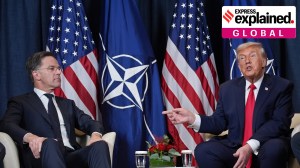To engage a changing world
Among the foreign policy challenges India will face in the foreseeable future would be the requirement to structure new equations with impor...

Among the foreign policy challenges India will face in the foreseeable future would be the requirement to structure new equations with important power centres of the world after the end of the Cold War and disintegration of the Soviet Union, because of the disappearance of leverages which India had in fashioning its foreign and security policies of the last 50 years8230;
South Asia, constituting nearly one-fifth of the world8217;s population, also happens to be one of the poorest regions of the world8230; There are also some fundamental security concerns affecting the region. The religious, ethnic and linguistic characteristics of the civil societies in these nations overlap with each other. This results in apprehensions about respective national identities. The challenge is to resolve the contradiction between the nature of the civil societies and anxieties about consolidating individual national identities by promoting civic nationalism that is integrative rather than separative.
The complexes and aspirations generated by the asymmetry between India, on the one hand, and other south Asian countries, on the other, has resulted in tensions in the region which need to be overcome. India has a special responsibility in this regard, while the other countries need to make an effort to overcome the burdens of history. Contentful regionalism is the only solution. The establishment of SAARC was an attempt at such regionalism. It has been stalled primarily due to political tensions8230;
Nonproliferation is another issue which requires a change of approach. There is a shift in international nonproliferation policies. The agenda of the established nuclear weapons powers is not so much about comprehensive disarmament as to ensuring an arms control programme on a discriminatory basis only to prevent the further horizontal proliferation of weapons of mass destruction. India should clearly emphasise its determination to preserve its nuclear weapons and missile assets. While doing this, it should endeavour to formulate an approach where it can assure the major powers that its weapons capacities in no way threaten their security interests, given its record as a responsible nuclear weapons state8230;
The choice is to confront and resist the US and get isolated, or to make ourselves a subordinate ally of the US, or adopt a strategy of engaging the US on the basis of equality while developing equations with other major powers to redress the imbalances of US dominance.
While India should maintain its relations with the international coalition on terrorism, in all its political and operational dimensions, we must be clear in our mind that we will have to fight our battle against terrorism on our own. It must also be kept in mind that crossborder terrorism does not emanate only from Pakistan. There are other groups operating in the Northeast and other states which have their origins, even links, with terrorist organisations like the LTTE. A sustained effort should be made to see that terrorist violence is not blindly applied to one religious community or the other, or one case or the other.
Excerpted from 8216;Reimagining the world8217;, in 8216;The Indian Express8217;, March 6, 2004
- 01
- 02
- 03
- 04
- 05































